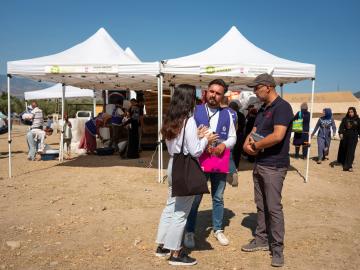
‘We know we are not forgotten’: Inside a Ukrainian bomb shelter keeping families safe and warm this winter
DEC charities are supporting people in Ukraine through the winter after the conflict left many without heating and electricity.
DEC charities are supporting people in Ukraine through the winter after the conflict left many without heating and electricity.

Olesia* plays after school in a public bomb shelter in Kharkiv. Image: Maciek Musialek/DEC

Many residential buildings have been badly damaged in Kharkiv and other cities in Ukraine, while power networks have also been hit. Image: Maciek Musialek/DEC
As attacks continue across the country, and with many homes destroyed or damaged, some families have moved into bomb shelters beneath buildings.
Mavka*, 39, and her daughter Olesia*, eight, live in a bomb shelter in Kharkiv, which has been heavy shelling throughout the conflict. Olesia* is still attending school online, but recent attacks on infrastructure have caused blackouts.
“We understand the kids need a daily routine so we wake up at 7am, wake the kids at 8am and get them fed and ready for online school lessons at 9am,” says Mavka. “Online education has been very hard because sometimes we haven’t had electricity - we can’t charge the tablets so they can’t see or hear their teacher.”
"There is hope for our kids’ future here now - they can continue learning so that they can have a better life."

Mavka* helps her daughter, Olesia* with her homework in a public bomb shelter in Kharkiv. Image: Maciek Musialek/DEC
“DePaul has helped so much,” says Mavka. “They brought us warm blankets - even though we sleep in our clothes we always use those blankets. They brought toothbrushes, toothpaste and other hygiene items. We have water in the taps and thank God, we have electricity!”
Using DEC funds, DePaul is delivering essential items to the shelters. Generators are helping to provide heat and electricity, allowing children like Olesia to continue their education.
“This place is a salvation for me,” says Mavka. “We have electricity here so there’s an opportunity for our children to have an education - the school year has started and Olesia* is now in the third grade [Year 4]. There is hope for our kids’ future here now - they can continue learning so that they can have a better life.”


Yulia's son, Kolia*, plays with a model glider in a public bomb shelter in Kharkiv. Image: Maciek Musialek/DEC
Yulia, 49, has two children, the eldest is 14 years old, and the youngest will soon be eight. In late February, the family were woken by the sounds of shelling, they fled their home and are now living in the shelter.
“We’d slept on paperboards at first but now the shelter is furnished with blankets, pillows and beds made from stools,” says Yulia. “When they made us beds to sleep on, the children were so happy, and then they even gave out sweets - pure happiness.”
The children are also studying online and Yulia, who worked as a physics and mathematics teacher before the conflict, also gives online lessons, all sharing one smartphone.
“One week we went three days without any power,” she says. “It is hardest for my eldest as he needs to be online more for school. We really need electricity generators for situations like this.”
“When they made us beds to sleep on, the children were so happy"

Yulia and her son, Kolia* sit on a bed in a public bomb shelter in Kharkiv.
“It’s worrying how cold and frosty it's going to get in the coming months but they say we’re going to have heating here now,” she says. “We know we’re going to get help now and that we are not forgotten, so here we hope we will get through the winter and continue to have a warm place to stay.”
Despite the challenging conditions, including intense shelling and power cuts, DEC charities continue to work to provide people with access to electricity, warmth, clean water and medical care this winter. DePaul is also distributing smaller portable generators to people living in villages as well as firewood to keep people warm. Volunteer cyclists deliver food to people who can’t leave their homes.
Thanks to the incredible generosity of the UK public, DEC charities can continue to ensure families like Yulia and Mavka’s are supported in the months and years ahead.
*Names have been changed to protect identities.



